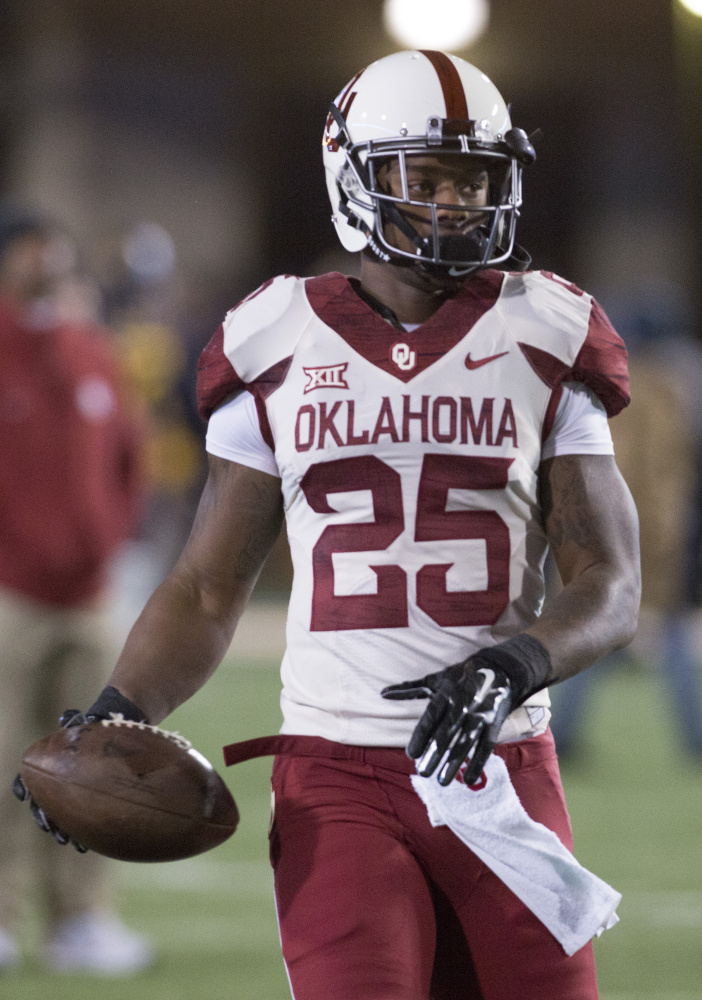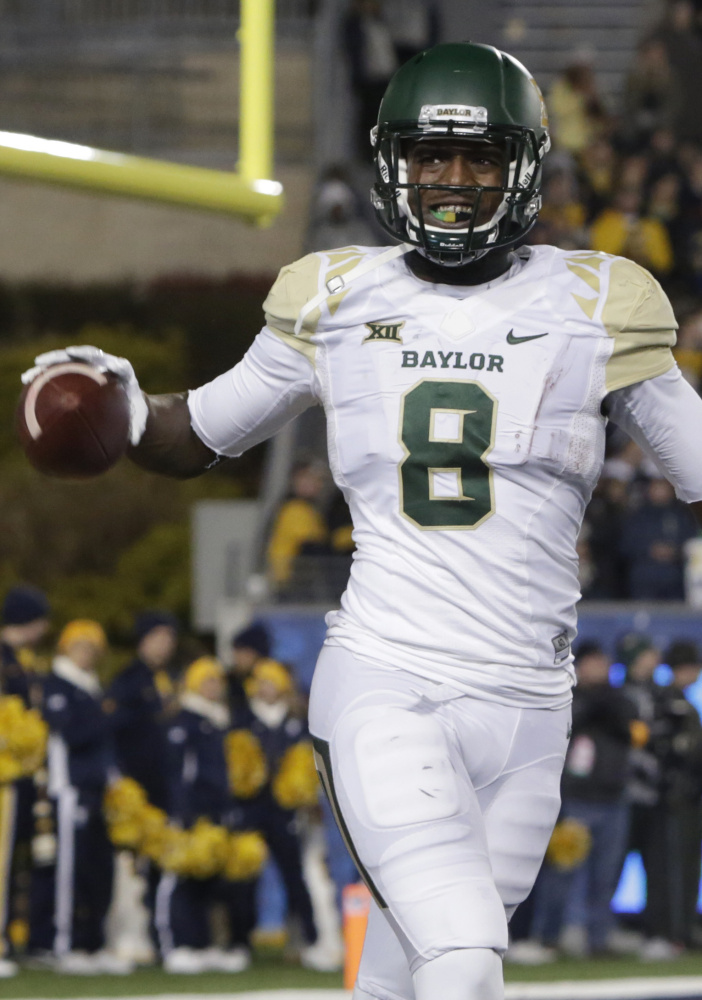Young athletes tend to believe that by simply burying a problem, they solve it. “They move past it, but they don’t fix it,” one NFL executive said. Their elders know different. They know that when an issue goes undealt-with, it tends to grow into something worse, a future flaw, an uncontrollable mood or self-sabotage. When you suppress something, it only becomes more powerful. That’s a law of nature, and it rules everything from soda cans to humans.
Joe Mixon, Chad Kelly and Ishmael Zamora weren’t invited to this week’s NFL combine because all three have buried impulses that caused them to misapply their fists in various ugly ways. They will now try to persuade NFL teams in individual interviews that they are better men than they seem, by invoking the timeworn excuse, “That’s not who I am.” But in the NFL, they are dealing with older executives who have seen a lot of Joes and Chads and Ishmaels, iterations of half-cocked young men who have messed up, and they have listened impatiently to the same words from all of them – only to find they are exactly that person.
“I feel like a lot of people don’t really know me,” said Mixon, a running back out of Oklahoma. “People portray me as one guy, as a bad guy. But at the end of the day, everybody who knows me knows that’s not me.”
No one wants to be known in their worst moment, much less videotaped in it, but that’s the predicament in which Mixon finds himself. The video, of course, doesn’t capture the totality of his person, but it does show Mixon in a cafe in 2014 as an 18-year-old freshman, crashing his fist into a female student’s face, breaking her jaw and cheekbone. The action itself continues to speak louder than any words he has said about it.
Mixon better find some words, because he is about to undergo an interview process unlike anything the usual job candidate experiences. NFL talent evaluators have learned, after being burned, lessons from law enforcement and psychological profilers. They will examine not just his words, but subtle details right down to the batting of eyes, and his posture in a chair, in an attempt to decide who he really is. “Cues of genuine remorse,” said the executive, who did not wish to be named. “Eyes, body language.” They will try to detect from his demeanor whether he treats the event as something to be brushed past, or something that has to be conquered. Has he made a cosmetic fix, or has he actually looked at himself?
The cell phone video capturing Zamora, a Baylor wide receiver, in his worst moment is all but unwatchable. While his dog cowers passively in a corner, he rears back and then hits it in the face with a belt, not once, but nine times. As the dog’s whimpering becomes a scream, he kicks it in the ribs.
“Eventually I hope everyone can see who I really am and that I am not a terrible person,” he said in a public apology. “This incident does not and will not define me, and I know that I am the one who will have to prove that to others in the days ahead.”
But here’s the problem for Zamora: According to the Humane Society, multiple studies in psychology and criminology show that intentional animal cruelty is of particular concern because “it’s a sign of psychological distress and often indicates that an individual has already been a victim of violence or might be predisposed to committing acts of violence.”
What NFL evaluators want to hear from anyone who has had a violent episode is something more than just promises. They want to hear the player reaching for some “self-understanding,” the team executive said. They don’t want to hear, “That’s not who I am.” They want to hear the more honest (and persuasive) statement: “I don’t know why I behaved as I did; I don’t know who that person was in that moment. But I’m getting help to find out, so that I never repeat it.”
For Kelly, a quarterback out of Ole Miss, the concern is not one video, but a long record of erratic behavior. Suspended from his Pennsylvania high school team as a freshman. Kicked off as a sophomore. Kicked off at Clemson in 2014. Arrested for brawling outside a bar in 2015 and threatening to “get my AK-47 and spray this place.” Rushing a high school field during a brawl last season involving his younger brother.
“I’ve made stupid mistakes in the past, I can’t deny that,” Kelly said at the Senior Bowl when asked what he will tell NFL teams. “With that being said, I’ve learned from it. I’m not the same person I was a long time ago. … They want to know if you’ve learned from it, that you won’t make the same mistake twice.”
Or, in his case, five times. “It’s a different kind of lack of patience with him,” the exec said.
Working in the favor of all three players is that the NFL, for better or worse, is a league of second and third chances. Partly that’s the result of cynicism and opportunism; teams are compelled to take risks because they have a need at a position and a player with a damaged rep is a cheap deal. But it’s also partly a lingering kind of innocence: The league has a persistent sympathy for the redemption-seeker, the belief that a 20-year-old’s crude aggression can be properly rechanneled.
It would be a shame to give up on that belief, because it would mean denying the epiphany, the possibility that someone can remake themselves, and say in all genuineness, “That was me, but it’s not anymore.”
There are success stories, guys who use the escape hatch the league offers to fashion a better self and better life. We may be seeing one in Kansas City Chiefs receiver Tyreek Hill, who in 2014 choked and punched his pregnant girlfriend. Lucky for him, there was no video of the incident, making it easier to draft him. He’s still completing counseling and a court-ordered batterer’s program. The indications are that he has embraced as much help as he can get, and has reached some peace with his victim.
Mixon, Zamora and Kelly likely will be offered second chances, because they’re intriguingly muscular if crude material, but also because when a risk on a young player works out, “It feels really good,” the executive says. “It’s very rewarding. Most of us got in this game … because we loved the game and what it did for us, and what it did for our friends and our families.”
Send questions/comments to the editors.





Success. Please wait for the page to reload. If the page does not reload within 5 seconds, please refresh the page.
Enter your email and password to access comments.
Hi, to comment on stories you must . This profile is in addition to your subscription and website login.
Already have a commenting profile? .
Invalid username/password.
Please check your email to confirm and complete your registration.
Only subscribers are eligible to post comments. Please subscribe or login first for digital access. Here’s why.
Use the form below to reset your password. When you've submitted your account email, we will send an email with a reset code.